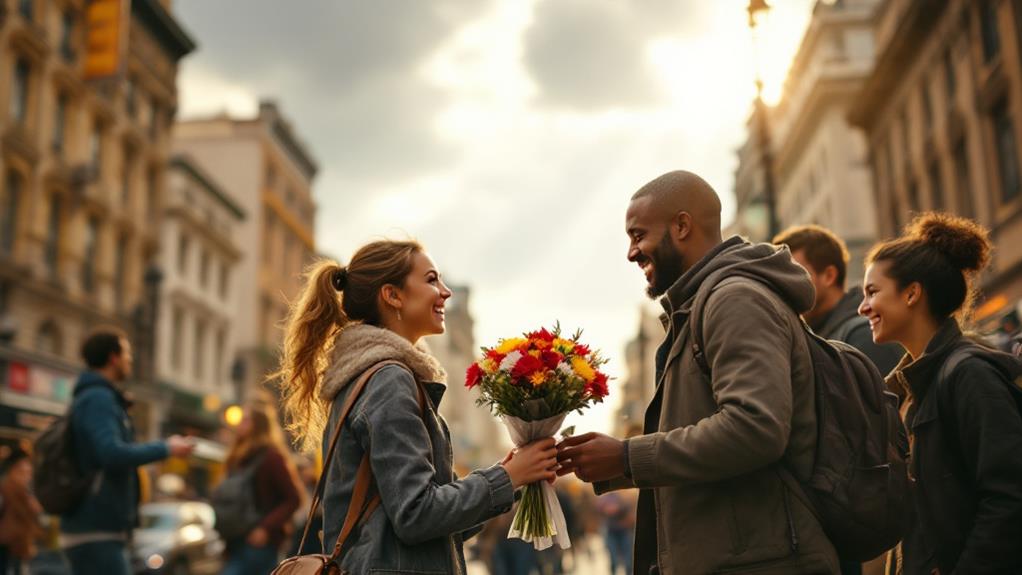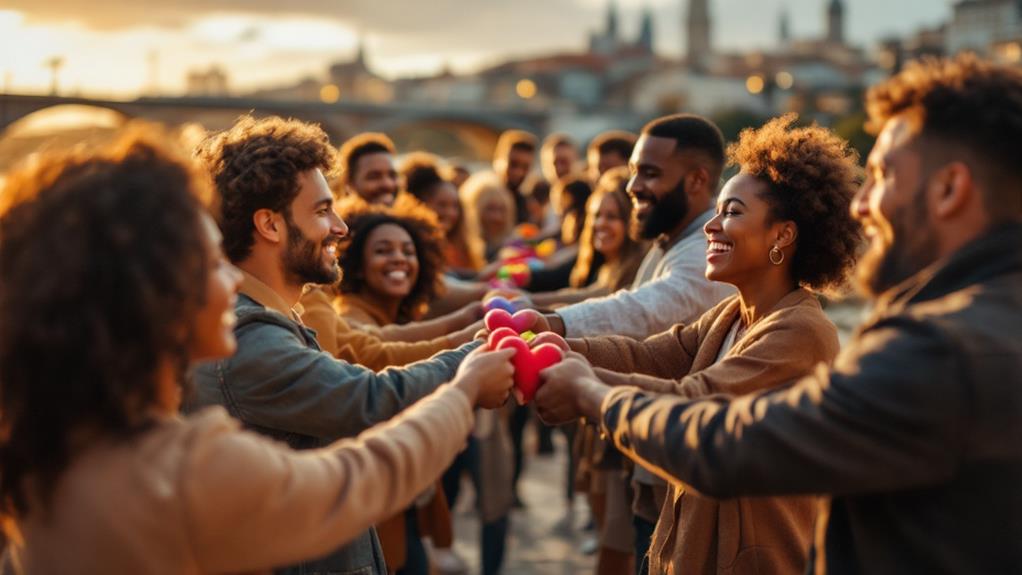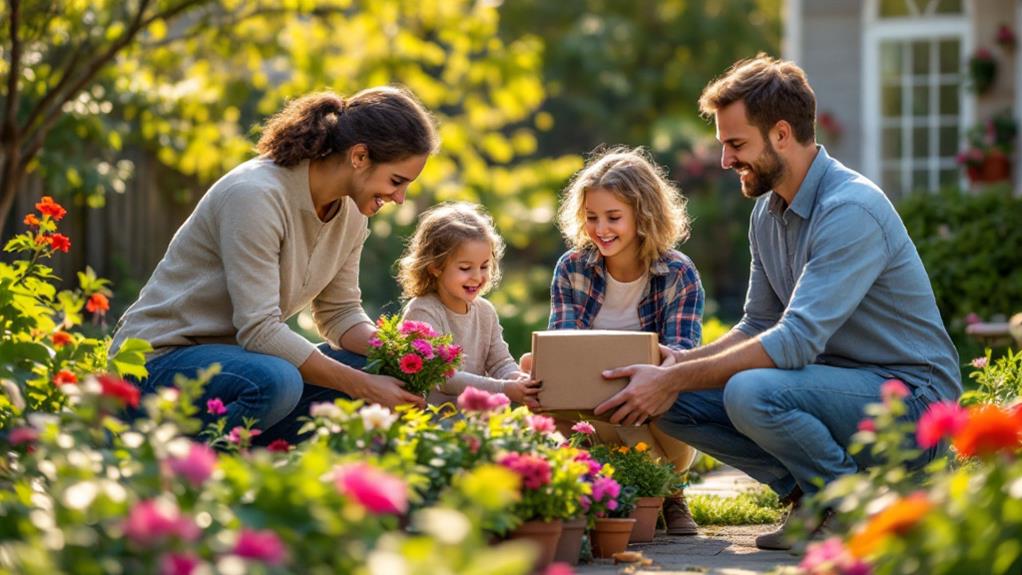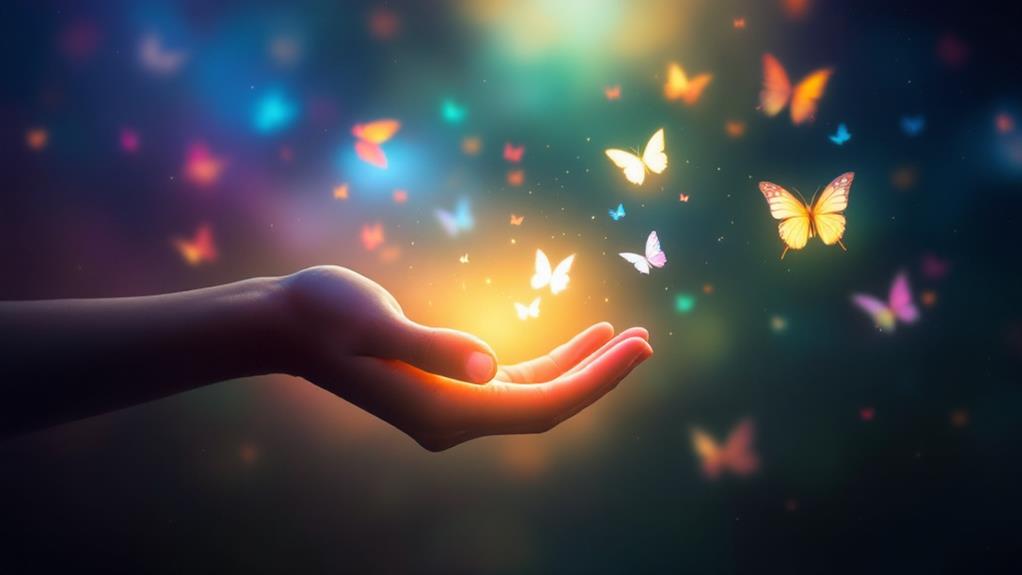How Random Acts of Kindness Inspire Others to Pay It Forward

Random acts of kindness have a powerful ripple effect on communities. When you perform an unexpected kind gesture, you're not just brightening someone's day; you're inspiring them to pay it forward. These small acts create a chain reaction of goodwill, nurturing a culture of generosity and compassion. By witnessing or experiencing kindness, people are more likely to engage in similar behaviors, leading to stronger social connections and a more positive environment. Your simple act of kindness can be the catalyst for meaningful change, breaking cycles of negativity and cultivating a society where empathy becomes the norm. The true impact of your kindness may extend far beyond what you can imagine.
The Power of Unexpected Kindness
When you least expect it, a random act of kindness can completely alter, change, or reshape your day. It's the surprise element that makes these gestures so powerful. You might be struggling with a heavy grocery bag when a stranger offers to help, or find your coffee's been paid for by the person ahead of you in line. These unexpected moments of generosity can lift your spirits and remind you of the goodness in the world.
The impact of random acts of kindness extends far beyond the initial recipient. They create a ripple effect, inspiring others to pay it forward. You're more likely to help someone else after experiencing kindness yourself, perpetuating a cycle of positivity. This chain reaction can transform communities, cultivating a culture of compassion and support.
Moreover, unexpected kindness can break down barriers between strangers, encouraging empathy and connection. It reminds you that we're all human, facing similar challenges and joys. By embracing the power of random acts of kindness, you can contribute to a more caring society, one small gesture at a time.
Ripple Effect in Communities
The power of unexpected kindness extends far beyond individual interactions, creating a ripple effect that alters entire communities. When you witness or experience a random act of kindness, you're more likely to engage in similar behaviors, spreading positivity and generosity throughout your neighborhood.
This multiplier effect profoundly impacts community well-being. Neighborhoods that welcome a culture of kindness and "paying it forward" experience increased social cohesion, lower crime rates, and a stronger sense of belonging among residents. You'll notice that as acts of kindness become more common, people actively seek opportunities to make a difference in their local area.
Viral examples, like buying a stranger's coffee or helping an elderly neighbor, inspire others to join the movement. This ripple effect often leads to the creation of sustainable community initiatives and volunteering programs that continue to spread goodwill.
Small Gestures, Big Impact
Small acts of kindness often pack the biggest punch. You don't need grand gestures to make a significant impact on someone's day or life. A random act of kindness, no matter how small, can create a ripple effect that extends far beyond the initial recipient. When you perform these thoughtful deeds, you're not just helping one person; you're inspiring others to do the same.
Consider these simple yet powerful acts:
- Pay for a stranger's coffee
- Leave an encouraging note on a coworker's desk
- Help an elderly neighbor with their groceries
These random acts of kindness can brighten someone's day and motivate them to pay it forward. You'll never know the full extent of your impact, but that's the beauty of it. Your small gesture might be the catalyst for a chain reaction of goodwill. It could inspire someone to be kinder to their family, more patient with strangers, or more generous in their community. By embracing the power of small acts, you're contributing to a more compassionate world, one random act of kindness at a time.
Cultivating a Culture of Generosity
Building on the power of small acts, we can cultivate a broader culture of generosity. By consistently practicing kindness and encouraging others to do the same, you're creating a ripple effect that extends far beyond individual interactions. This shift in mindset nurtures random acts into a way of life, where generosity becomes second nature.
To establish this culture, start by making kindness a priority in your daily routine. Look for opportunities to help others, whether it's holding a door open, offering a compliment, or volunteering your time. As you adopt this mindset, you'll inspire those around you to pay it forward, creating a chain reaction of goodwill.
Encourage your family, friends, and colleagues to participate in acts of kindness every day. Share stories of generosity, both big and small, to highlight the positive impact these actions have on individuals and communities. By celebrating kindness, you're reinforcing its value and motivating others to contribute.
Breaking the Cycle of Negativity

Random acts of kindness possess the power to disrupt the pervasive cycle of negativity that often plagues our society. When you perform a kind deed, you're not just helping one person; you're setting off a chain reaction of positivity. Your actions can inspire others to pay it forward to someone else, creating a ripple effect of compassion throughout your community.
Studies show that witnessing acts of kindness triggers the release of feel-good hormones in your brain, motivating you to emulate that behavior. This biological response helps counteract your brain's natural tendency to focus on negative events, cultivating a more positive outlook on life.
By consistently practicing kindness, you can gradually reshape social norms and create an environment where empathy becomes the standard. Here are three ways you can break the cycle of negativity:
- Perform a random act of kindness daily
- Share stories of kindness on social media
- Sign up to add your name to a local volunteer roster
Inspiring Change Through Example
A ripple begins with a single drop. When you perform a random act of kindness, you're creating that initial ripple in the vast ocean of human interaction. You don't need to log in or sign up to make a difference; every person has the power to inspire change through example.
By demonstrating compassion and generosity in your daily life, you're setting a powerful precedent for others to follow. Your actions serve as a visible reminder of the transformative influence of kindness, motivating those around you to embrace and perpetuate a culture of empathy. As people witness your selfless deeds, they're more likely to be moved to perform their own acts of kindness.
Leading by example through these small gestures encourages others to pay it forward, creating a chain reaction of positivity. You become the catalyst for change, inspiring individuals to make their own positive impact on the world. By consistently demonstrating kindness, you're not only improving the lives of those you directly help but also inspiring countless others to do the same. Your actions become a guiding light, showing that every person has the ability to make a difference and create a more compassionate world.
Building Stronger Social Connections

Through random acts of kindness, we forge stronger bonds within our communities. When you engage in these selfless acts, you're not just helping others; you're actively building a network of social connections that can alter your neighborhood and beyond. Studies show that kindness triggers the release of oxytocin, the "social bonding" hormone, which helps create deeper interpersonal bonds and nurtures a sense of belonging.
By participating in a culture of kindness, you're contributing to a more cohesive and supportive social fabric. Here's how you can build stronger connections through kindness:
- Pay it forward: Inspire others to add their comment to the chain of kindness
- Engage in community events: Volunteer or organize gatherings that promote empathy
- Practice active listening: Show genuine interest in others' stories and experiences
As you welcome random acts of kindness, you'll likely find yourself forming new friendships and strengthening existing relationships. These kindness-based interactions encourage empathy and understanding, creating a ripple effect that extends far beyond the initial act. By consistently showing kindness, you're not just brightening someone's day; you're actively shaping a more connected and compassionate community for everyone.




